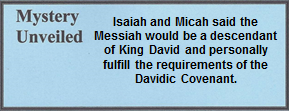03.02.03 8th Century B.C. Isaiah
The ministry of the prophet Isaiah began in the year 740 B.C., when King Uzziah died (Isa. 6:1).[1] He wrote his book during the Assyrian invasions and the decline of the northern kingdom. At this time the Assyrians were expanding into Syria and Canaan (745-727 B.C.) under the reign of King Tiglath Pileser III. Isaiah’s prophecies were not only for the immediate future, but also for the distant future, concerning the coming of the Messiah and centuries beyond. Those prophecies of the immediate future were quickly and literally fulfilled, which established his credibility as a true prophet. Therefore, it was understood that futuristic prophecies would also be literally fulfilled one day. For example, among the prophecies of interest to the 7th century B.C. people of Judea, was the prediction that stated the wealth of Jerusalem would be carried off to Babylon (Isa. 39:6). At the time of his writing, Babylon was an insignificant military power, and yet his prediction was literally fulfilled a century later. Isaiah also gave predictive words concerning the predecessor of the Messiah (40:3), which were later literally fulfilled, in the person of John the Baptist, who is more appropriately known as John the Baptizer (see Mt. 3:3; Lk. 3:4).
A voice of one calling out:
Prepare the way of the LORD
In the wilderness;
Make a straight highway for our God
In the desert.
Isaiah 40:3
When Matthew described Jesus as the chosen servant of God (12:18-21), he quoted the prophet Isaiah:
1 “This is My Servant; I strengthen Him,
this is My Chosen One; I delight in Him.
I have put My Spirit on Him;
He will bring justice to the nations.
2 He will not cry out or shout
or make His voice heard in the streets.
3 He will not break a bruised reed,
and He will not put out a smoldering wick;
He will faithfully bring justice.
4 He will not grow weak or be discouraged
until He has established justice on earth.
The islands will wait for His instruction.”
Isaiah 42:1-4
Concerning the future Messianic Figure, Isaiah described Him as having a supernatural nature (9:5-6), and restoring the relationship between man and God (49:6; 53:12). Chapter 53 is considered a classic description of Jesus. Isaiah described Jesus when He was beaten and bruised (53:2-3) before Pilate, when He carried our infirmities, sins, and punishment (53:4-8), when He was buried (53:9), and when He arose from the grave (53:10). Isaiah’s predictions concerning Jesus the Messiah have earned him the title of being the Gospel Writer of the Old Testament.[2] His favorite titles for the Messiah were “the servant of Jehovah” and “the servant of the Lord.” Prophets like Isaiah and Micah declared that the Messiah would be a descendant of King David and would personally fulfill the eternal requirements of the Davidic Covenant (Isa. 11:1-16; Mic. 5:2).

[1]. Uzziah is among fifty biblical names whose existence has been verified by archaeological studies in a published article by Lawrence Mykytiuk titled, “Archaeology Confirms 50 Real People in the Bible.” Biblical Archaeology Review. March/April, 2014 (40:2), pages 42-50, 68. This archaeological evidence confirms the historical accuracy of the biblical timeline. For further study, see the website for Associates for Biblical Research, as well as Grisanti, “Recent Archaeological Discoveries that Lend Credence to the Historicity of the Scriptures.” 475-98.
[2]. For the historical trail of the Davidic Covenant from David to Jesus, see the blue “Mystery Unveiled” boxes in 03.02.01, 03.02.03, 03.02.06, 03.03.01, 04.02.02, and 13.04.05.